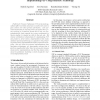Free Online Productivity Tools
i2Speak
i2Symbol
i2OCR
iTex2Img
iWeb2Print
iWeb2Shot
i2Type
iPdf2Split
iPdf2Merge
i2Bopomofo
i2Arabic
i2Style
i2Image
i2PDF
iLatex2Rtf
Sci2ools
181
click to vote
ICDE
2003
IEEE
2003
IEEE
Implementing P3P Using Database Technology
Platform for Privacy Preferences (P3P) is the most significant effort currently underway to enable web users to gain control over their private information. P3P provides mechanisms for web site owners to express their privacy policies in a standard format that a user can programmatically check against her privacy preferences to decide whether to release her data to the web site. We discuss architectural alternatives for implementing P3P and present a server-centric implementation that reuses database querying technology, as opposed to the prevailing client-centric implementationsbased on specialized engines. Not only does the proposed implementation have qualitative advantages, our experiments indicate that it performs significantly better than the sole public-domain client-centric implementation and that the latency introduced by preference matching is small enough for realworld deployments of P3P.
Database | ICDE 2003 | P3P Provides Mechanisms | Privacy Preferences | Public-domain Client-centric Implementation |
Related Content
| Added | 01 Nov 2009 |
| Updated | 01 Nov 2009 |
| Type | Conference |
| Year | 2003 |
| Where | ICDE |
| Authors | Rakesh Agrawal, Jerry Kiernan, Ramakrishnan Srikant, Yirong Xu |
Comments (0)

